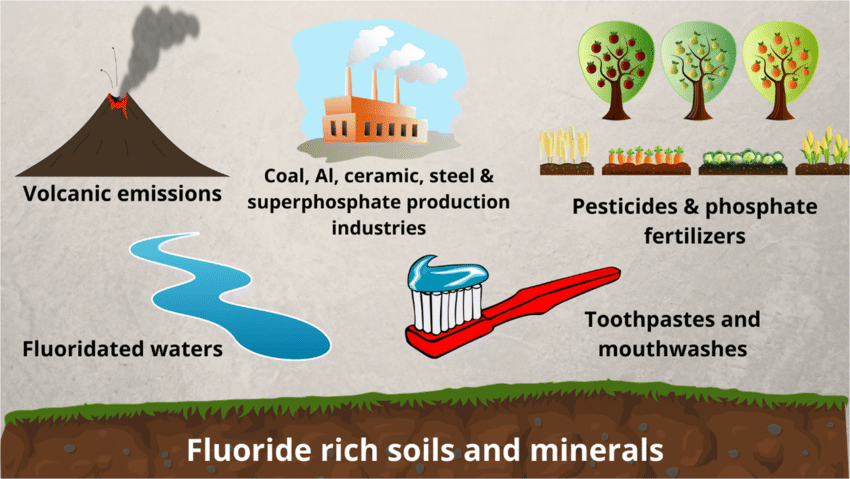Did you know that fluoride, a common element in our drinking water, has sparked intense debates for decades? Although dental care widely uses fluoride for its cavity-preventing properties, its presence in our water supply and potential health effects have been contentious topics. First, let’s understand exactly what fluoride is and why its classification matters. Fluoride is a naturally occurring mineral that is derived from fluorine, one of the most reactive and highly toxic elements on the periodic table. It is present in various concentrations in soil, rocks, and water sources across the globe.

Source: Researchgate.cet https://www.researchgate.net/figure/Main-fluoride-sources-from-the-environment_fig1_343174287
What is fluoride classified as?
Fluoride is not considered a heavy metal by scientific bodies. Heavy metals are typically defined as relatively dense metals or metalloids with high atomic weights, such as lead, mercury, and cadmium.
Fluoride, on the other hand, is a non-metallic element with a lower atomic weight and different chemical properties. However, some studies of public health agencies like the WHO and EPA have suggested that fluoride can exhibit similar toxic effects as heavy metals at high concentrations.
The classification of fluoride is relevant when it comes to water filtration because certain filtration systems are designed specifically to remove heavy metals while others are very effective at removing fluoride and other contaminants. For example, reverse osmosis (RO) filtration and waterer distiller systems like the Megahome water distiller can effectively remove fluoride from water, along with other dissolved solids and contaminants.
What does fluoride do to your body?
Fluoride has been widely used in dentistry for its ability to strengthen tooth enamel and prevent cavities. This is why many municipalities add fluoride to their public water supplies in a process called fluoridation.
However, excessive exposure to fluoride can lead to a condition called dental fluorosis, which causes discoloration and pitting of the tooth enamel. In severe cases, skeletal fluorosis can occur, causing joint pain, calcification of ligaments, and bone deformities.
The debate surrounding fluoride centres around the optimal levels for its benefits versus the potential risks of overconsumption. The National Health and Medical Research Council (NHMRC) has set guidelines for the recommended levels of fluoride in Australian drinking water, typically ranging from 0.6 to 1.1 milligrammes per litre (mg/L).
Interesting Facts:

- Fluoride is more abundant in the earth’s crust than lead, mercury, and cadmium combined.
- Fluoride was first used as a dental treatment in the early 20th century after researchers noticed that communities with naturally high levels of fluoride in their water had fewer cavities.
- While fluoride is added to many municipal water supplies, some countries, including Japan, Israel, and most of Europe, have chosen not to fluoridate their water due to concerns about potential health risks.
- Certain types of tea, particularly brick tea and matcha, can contain high levels of fluoride due to the accumulation of fluoride in the soil during the plant’s growth.
- Some water filter systems, such as reverse osmosis (RO) filtration, under sink water filters, and countertop water filters, can effectively remove fluoride from drinking water, along with other contaminants.

The debate on fluoride continues and it is essential to seek guidance from reputable health organisations and trusted sources. Fluoride has undeniable benefits for dental health, but it’s crucial to be aware of the potential risks associated with excessive exposure and ingestion. If you have concerns about fluoride levels in your drinking water, consider exploring water filter that filters fluoride like RO filtration, undersink water filter, and benchtop water filters to ensure you’re consuming water that aligns with your preferences and health goals.




